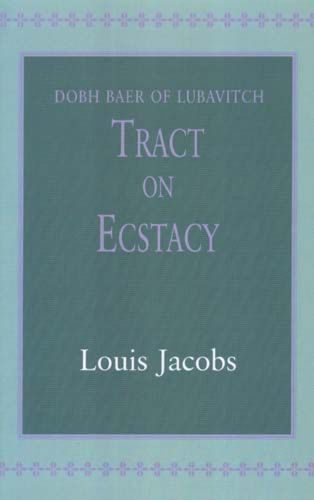Readings Newsletter
Become a Readings Member to make your shopping experience even easier.
Sign in or sign up for free!
You’re not far away from qualifying for FREE standard shipping within Australia
You’ve qualified for FREE standard shipping within Australia
The cart is loading…






Dobh Bear of Lubavitch (1773-1827), the author of Tract on Ecstasy , assumed the leadership of the Hasidic sect of Habad on the death of its founder, Schneor Zalman of Liady. The tract is in the form of a letter, sent by Dobh Baer to his followers, advising them on the role of ecstasy in the religious life. Although the teachers of Hasidism were seasoned Talmudists who could not have been accused of neglecting the claims of the intellect in the life of religion, it remains true, nonetheless, that for most of them Hasidism appealed chiefly to the emotions. Religious ecstasy, particularly in prayer, was the good to be cultivated by the Hasid. Contemplation was of value, but mainly because of the ecstasy it could induce. When Dobh Baer assumed leadership of the Habad, however, he found much confusion in the understanding of ecstasy and its relationship to self-awareness. His thesis in Tract on Ecstasy is that those who decry ecstasy are wrong, and that there is no such thing as a de-personalised state of contemplation in which the self does not feel anything. On the contrary, the power and validity of contemplation was to be observed in the degree of ecstasy it induced.Drawing a distinction between authentic and unauthentic ecstasy, Dobh Baer refutes the charge that because ecstasy involves self-awareness it is therefore a betrayal of Habad teaching, and in Tract on Ecstasy provides a penetrating analysis of the degrees of true ecstasy.
The Tract was originally written in c.1814, and this book is based on a manuscript copy, probably written by Samuel, Dobh Baer’s chief scribe and copyist. The reader cannot fail to hear through these pages the voice of one who was an adept, to use his own terminology, in listening to ‘the words of the living God’.
$9.00 standard shipping within Australia
FREE standard shipping within Australia for orders over $100.00
Express & International shipping calculated at checkout
Dobh Bear of Lubavitch (1773-1827), the author of Tract on Ecstasy , assumed the leadership of the Hasidic sect of Habad on the death of its founder, Schneor Zalman of Liady. The tract is in the form of a letter, sent by Dobh Baer to his followers, advising them on the role of ecstasy in the religious life. Although the teachers of Hasidism were seasoned Talmudists who could not have been accused of neglecting the claims of the intellect in the life of religion, it remains true, nonetheless, that for most of them Hasidism appealed chiefly to the emotions. Religious ecstasy, particularly in prayer, was the good to be cultivated by the Hasid. Contemplation was of value, but mainly because of the ecstasy it could induce. When Dobh Baer assumed leadership of the Habad, however, he found much confusion in the understanding of ecstasy and its relationship to self-awareness. His thesis in Tract on Ecstasy is that those who decry ecstasy are wrong, and that there is no such thing as a de-personalised state of contemplation in which the self does not feel anything. On the contrary, the power and validity of contemplation was to be observed in the degree of ecstasy it induced.Drawing a distinction between authentic and unauthentic ecstasy, Dobh Baer refutes the charge that because ecstasy involves self-awareness it is therefore a betrayal of Habad teaching, and in Tract on Ecstasy provides a penetrating analysis of the degrees of true ecstasy.
The Tract was originally written in c.1814, and this book is based on a manuscript copy, probably written by Samuel, Dobh Baer’s chief scribe and copyist. The reader cannot fail to hear through these pages the voice of one who was an adept, to use his own terminology, in listening to ‘the words of the living God’.